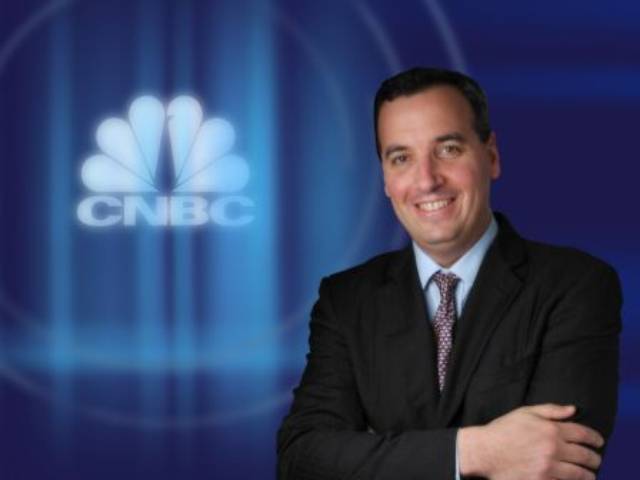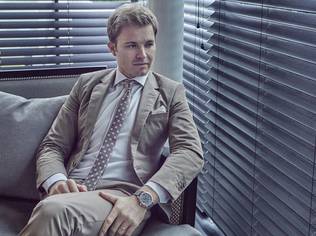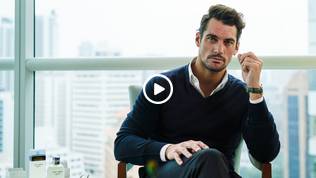CNBC Asia Pacific's President & Managing Director, Jeremy PINK, talks travel, team playing and tutelage of a multi-million dollar media business. Growing up in Columbus, Ohio this avid sports fan got to fulfill his ambitions at an early age, and went on to become an in-demand globe-trekker making waves in the industry with his superior business acumen.
Despite his hectic work schedule he still holds true to his love for family, and is firmly settled in Singapore (when he's not traveling that is). Highly respected among his peers for his integrity, he's certainly one man you can expect many more future successes from.
Profile
FULL NAME: Jeremy PINK
PLACE OF BIRTH: Wilmington, Delaware
AGE: 42
CITY OF RESIDENCE: Singapore
EDUCATION: MBA from Duke University
CAREER: CNBC Asia Pacific
Did you actually envisage and plan for the career path that you've taken, or was it more an organic route where you've just happened to find yourself here? How did it come about?
To say it was a plan would be widely incorrect. I've always been a guy who's liked sports. I grew up in Columbus, Ohio and at that time it was a two newspaper town in the early to mid-80s where the two newspaper towns were moving towards becoming one newspaper towns.
There was a newspaper that was holding in the city, more of a sports editor who was my baseball coach growing up. He knew I liked sports, and as I was the editor of my high school newspaper he asked what I was doing for the summer and asked me to work for him in the sports department of a major newspaper when I was 18-19 years old. So I did that when I was at school.
Next thing I know the paper folded and I got a call from the other newspaper the next day, asking if I could work with them, which I did for my last couple of years of college. So, it started there and I realised I was getting paid to watch baseball games and football games. It's great. It's like getting paid to do what I was going to do anyway.
Later, I got a job offer at CNN in Atlanta doing a bunch of sports for them. I did that, and then decided that I couldn't really do sports on a full-time basis any more.
I've always been interested in business and financial news and was hired by CNN, and moved within CNN, from Atlanta to New York to do a lot of their business coverage.
Interestingly enough I was assigned to do a project on one of the networks for CNN that was designed to be something that was going up specifically against a new television network that was launching in the United States, and that television network was called CNBC.
I moved to CNBC and did a lot of business programming with them. I eventually left and said, “I'm never going to go back to TV again" and went on to get my MBA.
CNN hired me again right after school and it was a very good offer in that part of the deal was I'd eventually come to Asia with CNN. It wasn't working out as quickly as I thought and a new network was starting out here in Asia in 1993 called the Asia Business News, and they offered me a job so I came out here.
I stayed here for a number of years, then went back to New York in the beginning of 1998 and started up an international financial services company with a couple of people and once again vowed I'd never go back to television.
We sold it off in pieces in mid-2000 and as that was happening, I got a call from CNBC asking if I could go out to London. So I moved to CNBC in London for about five years and then I came out here again. I had a brief stop in New York in the middle, so it's kind of gone full circle.
I guess that means my next trip is back to New York and then to London.
Because of your role you've managed to live in so many countries and cities including New York and Atlanta, Asia-Pac followed by Europe, the US and Singapore. What are some creature comforts you must have with you wherever you live?
My wife and my kids, that's it. You know it's interesting, I often feel I sound pretentious but it doesn't really matter where I live. I think you can adapt to anywhere you live. As long as my family is with me, I'm fine and we'll figure it out.
Having travelled a lot, tell us how many countries have you actually visited? Any particular favourite destinations that are a must-see or experiences that are a must do?
I actually have no idea about how many countries I've visited.
I must say you have to see Yankee stadium in New York. You have to see Bora Bodora in Indonesia, and the Taj Mahal without a doubt.
It sounds trite but I think you have to see the Grand Canyon too. The Grand Canyon is one of those things you have to see to appreciate, it's phenomenal! Even growing up as an American, I never had a desire to go and I went out when I was heading back to the West Coast after I was living in Asia, with somebody from Asia who really wanted to see it. It was fantastic! It was the greatest thing I've ever seen.
You've got to eat your way through Rome for at least a week.
CNBC is owned and managed by NBC Universal - the broadcasting unit of GE - and it's currently ranked number one on the list of "Global Most Admired Companies' by Fortune Magazine. What is that you personally admire most about your company?
I think it is, without question, the integrity of the business that is unquestionably number one. It is how people do business. It is the tremendous training and support the company gives its employees. It's overall commitment not just in business but back to the community. It's the driver of the great movement, eco-imagination. It's the management practices themselves which are fantastic.
I went to business school and I think there I learned tremendous amounts about how to manage a business, and just by interaction with my junior colleagues, and also the training they offer for employees internally is just fantastic.
CNBC is distributed 400 million homes around the world. What do you think is the key to capturing such a large market? What is the common denominator here?
Money. Money transcends all languages. Money transcends all cultures. It's very important in every culture. We talk about money, we talk about business but we talk about it in a way that is accessible, it's smart and it's entertaining. And I think that works. It's something that people are interested in, and it is something that we can talk about in a way that nobody else can.
They say people are either leaders or managers ~ would you agree and what would you say your own style is most reflective of?
I don't agree with that. I think people are in general leaders or followers. I think that either a follower or a leader can both be a manager. I like to think of myself as a leader.
Who or what has been the greatest inspiration to you on both a personal and professional scale? What drives you to be a success?
Well, that's a hard question. I look for anything that I find to be challenging, whether it's intellectually challenging or it's challenging from a work point of view. Whether it's challenging from learning about new people and new cultures. That's what really drives me.
In terms of inspiration and who's inspired me, I've never really had a hero in sports and was never really excited about a music group or never was really like, “Wow, I want to be like that person". I've never really had that kind of opinion. I credit my brother, who is extremely gifted and talented in his field as somebody who I think helped inspire my overall work ethic. I think that's fair to say.
How do you inspire people and get the best out of them? What have you found works the best over the years?
Fundamentally I would say it comes down to hiring people and the way you hire people. You have to look for a number of things when you hire somebody. You have to find people who think differently than you and look at who can challenge you.
People who you could foresee in your job in a number of years, or in whatever functional area they're in, moving up aggressively. I think you have to have people who see the company first and themselves second, and they're honest. They're the types of people I look for.
If you can find those people, (they're very difficult to find), you can trust them and build really good things. You may not agree with a lot of things they do, but it may be right or it may be wrong. But I think you have to give people the room to do things on their own and not to dictate too much exactly what you think needs to be done, because if you need to dictate too much you've probably not hired the right people. So that's what I look for.
You're the contributing author of "The Routledge Critical Dictionary of Global Economics" (1999) and "E-Finance Report" (2001). Who approached who and explain how that came about?
I was a journalist for a while so I've been published in a number of publications so the book on economics was just as I'd finished spending four and a half years in Asia and the person who was compiling that book was looking for somebody to summarise what had been going on in Asia over the last four or five years.
The E-Finance report was again something that we had worked with a publisher to publish books related to a number of things that we were doing in my previous business. One of the authors in that whole stable of books was putting something else together, another project called and he asked me to contribute to that too.
Part of your role with CNBC focuses on negotiating deals. But tell us how good are you at negotiating deals at barter markets during your travels?
You know what, I think, like with anybody else, if the deal is for me personally, I wouldn't hire me to be my own agent. So if I want something in a market, I'll ask my wife to barter. You just can't be your own agent. To answer your question, it depends what you're bartering for. I'm really not great at it.
Reveal something to our members that they wouldn't actually know about you?
I'm an undefeated spelling bee champion. I retired when I was ten years old.
For the best business news in the Asia-Pacific region, visit www.cnbcasia.com












